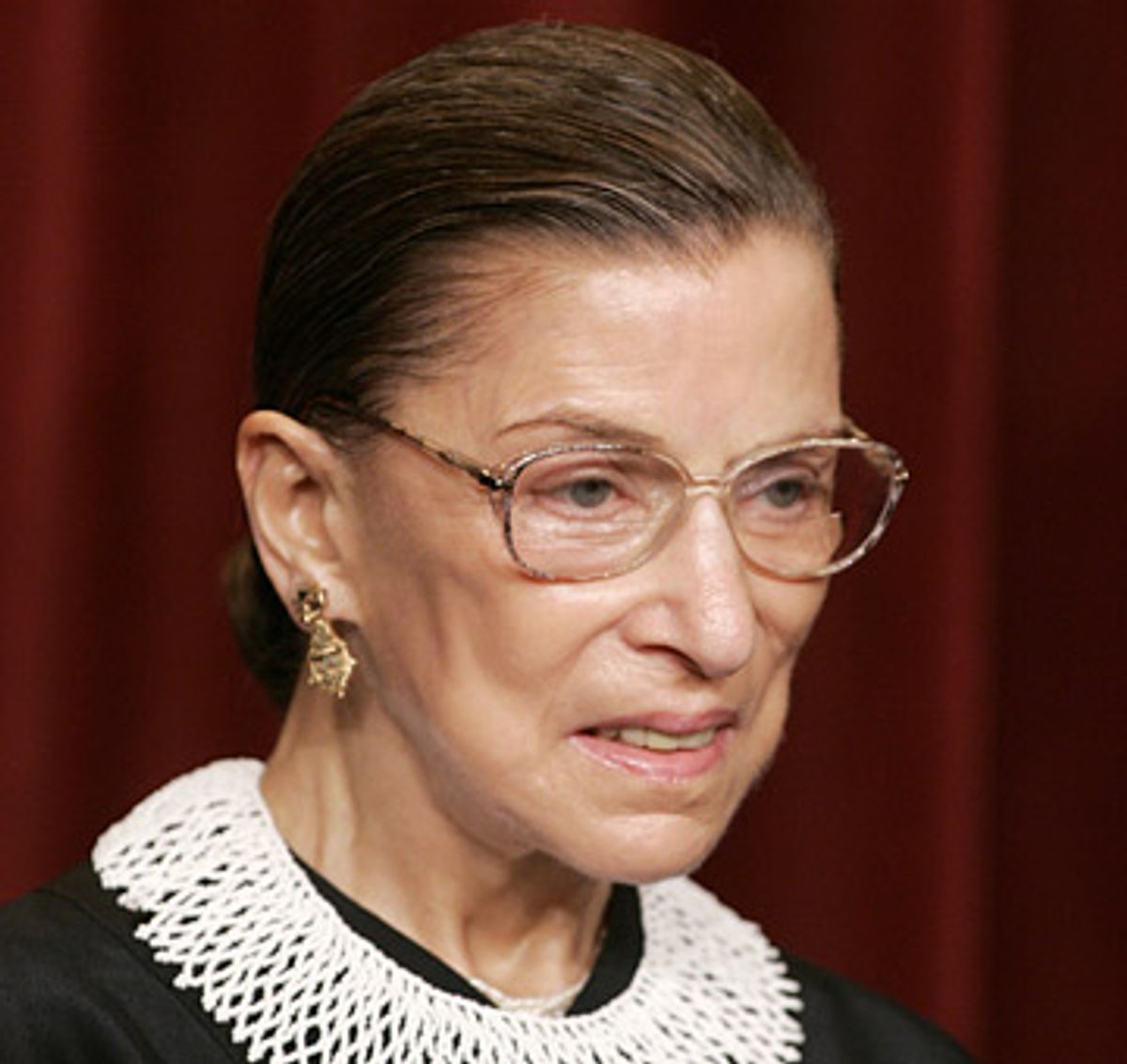Supreme Court Justice Ruth Bader Ginsburg, so slight, so frail, so like your bubbe in her tight bun and Boca-size glasses, was pissed.
When she read aloud from the bench a summary of her dissent in Gonzales v. Carhart, her words were incandescent, shimmering with rage and steely reason. The protection of reproductive rights, she said, is not a matter of "some vague or generalized notion of privacy" but of "a woman's autonomy to decide for herself her life's course, and thus to enjoy equal citizenship stature."
She lit into the majority's decision for its open "hostility" toward Roe. She also faulted the argument that a health exception is unnecessary as it would apply to a small percentage of women, writing with vivid italics that "the very purpose of a health exception is to protect women in exceptional cases." In summarizing her dissent, Ginsburg blasted the paternalistic assumption that the Court shields women by denying them the option to have abortions they might "regret." She said, "This way of protecting women recalls ancient notions about women's place in society and under the Constitution -- ideas that have long since been discredited." In short, Ginsburg concluded, the idea that the decision "furthers any legitimate governmental interest is, quite simply, irrational."
The 74-year-old justice had every reason to be livid. "Her life has been about achieving equal rights and opportunities for women under the law," says the pro-choice activist Kate Michelman. "This ruling must have been extremely painful for her."
No doubt it was. Since the 2005 retirement of Sandra Day O'Connor, Ginsburg has been the only woman on a bench lousy with alpha males. She has been open about her loneliness, commenting that while she and O'Connor often disagreed, they shared "certain sensitivities that our male colleagues lack." When she first joined the Court, she and O'Connor were given T-shirts that read, I'm Sandra, Not Ruth, and I'm Ruth, Not Sandra. It's a knee-slapper, until you remember that at the time of her confirmation Ginsburg predicted, "[I]n my lifetime, I expect to see three, four, perhaps even more women on the High Court Bench."
Here she is, 14 years later, the lone woman, writing her response to a decision that concretizes a terrifying turn on the part of the Court: the assignment of a higher value to fetal well-being than to female well-being.
Born and raised in Brooklyn, Ginsburg got her law degree from Columbia University in an era when it was not easy for a woman, a Jewish woman, to pursue a legal career. She cowrote a landmark casebook on sex discrimination, was the first woman tenured at Columbia Law School, and cofounded the American Civil Liberties Union's Women's Rights Project. Appointed to the U.S. Court of Appeals in 1980, Ginsburg was nominated by Bill Clinton in 1993 to fill the seat of retiring Justice Byron White, the man who wrote a dissenting opinion in Roe. "She's paved the way for women to be treated as full equals in society, not to be defined by the maternal roles they choose," Michelman says.
Ginsburg understands the balancing act intimately: Her first child was one year old when she entered law school, and she hid her second pregnancy under loose clothes while an untenured professor. It helped that her husband of 53 years, the tax lawyer Martin Ginsburg, took domestic partnership literally; the two divided child-care duties, and he does most of the cooking, even baking birthday cakes for her Supreme Court clerks and fellow justices. His wife, reserved and soft-spoken, has been taken for a frosty intellectual. Yet how could a woman whose passions have included opera and horseback riding and waterskiing be such a thing? Now, try this one on: She is a close friend of her fiercest ideological opponent, Justice Antonin Scalia. In her Supreme Court chambers there is a photo of them riding an elephant together.
Since we've been in the clutches of an administration intent on ripping up the road that women like Ginsburg laid down, she's become a cultural hero. John Edwards, Bill Richardson, and Christopher J. Dodd, when citing their favorites among living justices at the April Democratic debate, all named her. She is recognized as a last bastion of enlightened thinking in federal law. And even though she is unable, with Justices John Roberts and Samuel Alito tipping the Court back in time, to prevent rulings like Carhart (which, as she wrote in her dissent, "chip away" at rights central to women's lives), Ginsburg showed in her dissent that she intends to wedge her small shoulder firmly against the door and do her damnedest to hold back the ideological battering ram of the right.
But all that last-bastion business is a little sad. How exhausting to be fighting this battle all over again. How draining for a woman in her mid-seventies, who powered through colorectal cancer in 1999 without missing a Court session. Ginsburg has said that she will continue to do her job for as long as she is able. It's unfair, really. After all, maybe she'd like to retire too -- ride a few more elephants, see a few more operas.
But for now, we have to rely on her to keep her word. This small woman of steel is all we have.



Shares